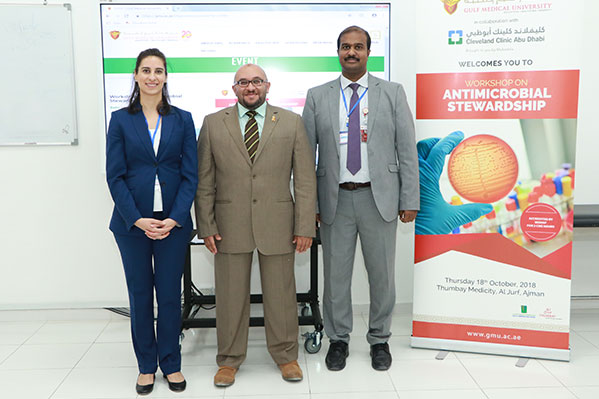
College of Pharmacy organized and delivered a workshop on ‘Antimicrobial stewardship’ in collaboration with Cleveland Clinic, Abu Dhabi (CCAD), on 18 October 2018. The workshop was attended by students from PharmD and Master in Clinical Pharmacy programs, pharmacy practitioners from Thumbay Hospital Ajman, and others.
Dr. Ahmed Mohamed Al-Abd, Associate Professor of Pharmacology at College of Pharmacy, on his session titled ‘Pharmacology of Antimicrobials’ listed the commonly used antimicrobial agents, their mechanism and spectrum of action, and highlighted the clinically significant side effects and contraindications. In addition, he also sensitized the participants on the limited availability of newer antimicrobials in pipeline and hence the need for rational use of available antimicrobials.
Dr. Subish Palaian, Associate Professor of Pharmacy Practice at College of Pharmacy presented on ‘Antimicrobial Resistance’ wherein he highlighted the contributory factors for antimicrobial resistance, mechanisms behind development of bacterial resistance, the outcomes of resistance and available strategies to contain antimicrobial resistance. He also introduced a ‘small group activity’ for the participants, divided in small cohorts of 5-7 members, wherein each cohort performed literature search and their representatives presented on their tasks, all highlighting the role of pharmacists in combating antimicrobial resistance.
Dr. Rania El-Lababidi, Senior Manager, Pharmacy Education and Training, CCAD, UAE presented on the ‘Overview and Implementation of Antimicrobial Stewardship Programs and Strategies’ wherein she described on: the effective antimicrobial stewardship program (ASP) interventions to optimize antimicrobial usage, new innovative interventions to consider for ASP, and the strategies used by CCAD’s antimicrobial stewardship program. In a subsequent session, Dr. Rania described ‘Antimicrobial Stewardship: A Case Based Approach’ and elaborated on: the basic antibiotic stewardship principles, how to interpret a culture and sensitivity (C&S) report, how to determine the appropriateness of therapy based on organism susceptibility and available data, and how to recommend empiric therapy in consideration of clinical symptoms and absence of documented cultures. Dr. Rania also presented interesting case studies covering complicated urinary tract infection, diabetic foot infection, intraabdominal infections and pneumonia.

This workshop was accredited for 2 CME hours by the Ministry of Health and Prevention (MOHAP). This is the 4th continuing professional development educational event conducted by the College of Pharmacy at GMU in 2018.

